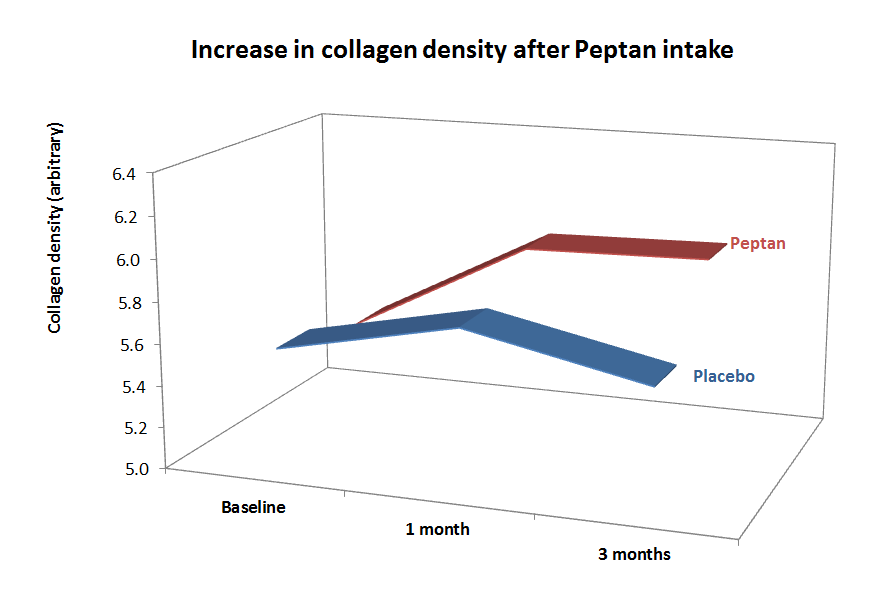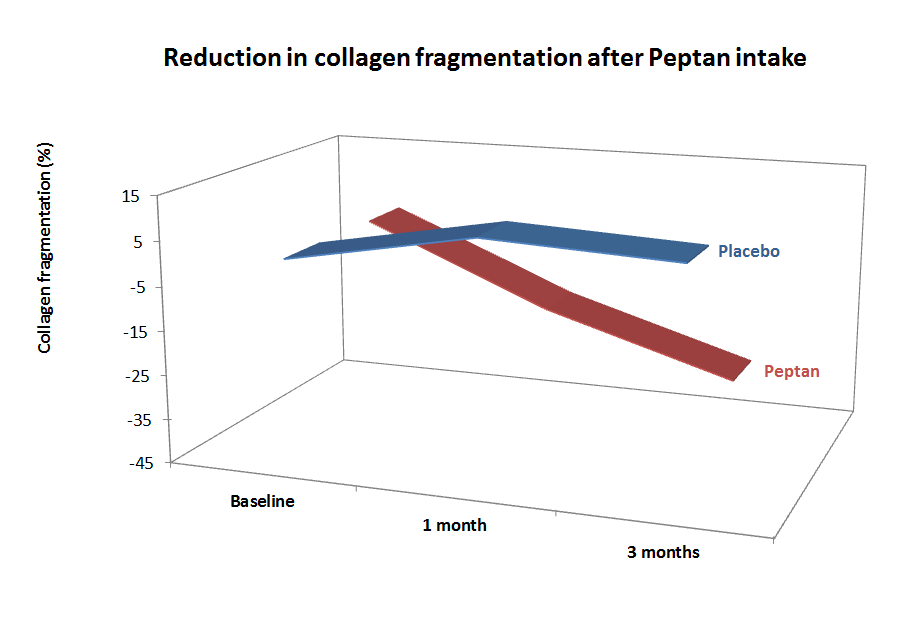New publication of skin studies highlights the unique efficacy of collagen peptide intake on the restructuring of deep skin layers
At SupplySide West 2015 taking place in Las Vegas from 5th until 9th October, Peptan experts will be ready to answer questions on the new published article at Rousselot/Peptan booth #1357.
The first comprehensive scientific publication of research into the anti-aging benefits of Peptan® collagen peptides has just been released1. Appearing in the Journal of Cosmetic Dermatology, this latest paper elevates the science behind collagen peptides taken as a supplement for skin beauty to the next level by revealing strong clinical evidence to prove Peptan’s ability to restructure the collagen network in deep skin layers. This represents a true breakthrough in skin anti-aging science. The newly published data also presents a statistically significant effect of Peptan collagen peptides on skin hydration explained by the stimulation of hyaluronic acid production.
This new compilation2 of skin health research performed by leading dermatological institutes Laboratory Cosderma and EC Biolab in France and the Souken Laboratory in Japan, features evidence from two double-blind placebo-controlled clinical trials on Asian and Caucasian women with different skin types, backed by further ex vivo studies on skin tissue3. The clinical research showed highly important skin anti-aging benefits: Peptan significantly decreased the fragmentation of collagen in the deep layer of the dermis by -18% after 4 weeks and as much as -31% after 12 weeks of intake. Peptan also significantly increased the density of collagen in the dermis by + 9 % after 4 weeks of intake. Skin hydration increased by an impressive 28%, counteracting the appearance of the dry skin that typically occurs through aging. The ex vivo studies demonstrated Peptan’s anti-aging effects from a mechanistic point of view with key findings including the positive impact of Peptan on the skin cell’s (fibroblast’s) ability to produce collagen fibers and glycosaminoglycans (GAGs) such as the moisture-trapping hyaluronic acid.
Commenting on the published data, Dr Jérôme Asserin of Laboratory COSDERMA said: “At COSDERMA we are specialized in the analysis of safety and efficacy of ingredients for the skin, ensuring a high level of scientific research quality and independence of the studies. The actual results for women who took the collagen peptide supplement show a real effect on restructuring the collagen network by decreasing fragmentation.”
Dr Elian Lati of the BIO-EC Laboratory added: “The results delivered by Peptan collagen peptides within the skin tissue were real: there is a particularly high stimulation of GAGs such as hyaluronic acid. The ex vivo study provided important insights into the mechanisms of collagen peptides on tissue level which provide the basis for its skin anti-aging effects”.
The Journal of Cosmetic Dermatology’s review provides the first ever publication of data to show skin restructuring effects after taking a nutraceutical ingredient. These data are substantiated by a high level of scientific research and the only results to date to demonstrate the underlying mechanism of how collagen peptides help strengthen and rejuvenate the deeper skin layers and maintain the cohesive and dense collagen network that is key to prevent wrinkles and sagging. The significant effect of Peptan collagen peptides on skin hydration is also noteworthy – as maintaining well hydrated skin is crucial for smooth, plump skin and prevent the formation of micro relief wrinkles. The paper provides clear, compelling evidence to support the use of collagen peptides in ingestible ‘Beauty from Within’ products and gives manufacturers a proven ingredient solution when looking to enter the dynamic nutricosmetic market.
Peptan collagen peptides are safe, bioactive peptides, optimized through a careful hydrolyzation process to make them easily digestible, highly bioavailable and able to promote specific benefits in the target tissue. Globally recognized as the preferred bioactive ingredient of leading nutricosmetic brands, Peptan is now benefiting from a notable increase in popularity in Western markets thanks to the growth of the nutricosmetics industry outside of Asia. Credible scientific research provides nutricosmetic manufacturers with vital information when looking to create clear differentiation for their products in a competitive market place.
References:
1. Asserin, J. et al., 2015. The effect of oral collagen peptide supplementation on skin moisture and the dermal collagen network: evidence from an ex vivo model and randomized, placebo-controlled clinical trials. Journal of Cosmetic Dermatology, doi: 10.1111/jocd.12174
2. The studies have been performed by independent institutes commissioned by Rousselot.
3. Postlethwaite, A.E. et al. 1978. Chemotactic attraction of human fibroblasts to type I, II, and III collagens and collagen-derived peptides. Proceedings of the National Academy of Sciences of the United States of America. 75(2): 871-875.
3. Shigemura Y, et al. 2009. Effect of prolyl-hydroxyproline (Pro-Hyp), a food-derived collagen peptide in human blood, on growth of fibroblasts from mouse skin. Journal of Agricultural and Food Chemistry 57(2), 444-449
3. Ohara H, et al. 2010. Collagen-derived dipeptide, proline-hydroxyproline, stimulates cell proliferation and hyaluronic acid synthesis in cultured human dermal fibroblasts. Journal of Dermatology., 37: 330-338


